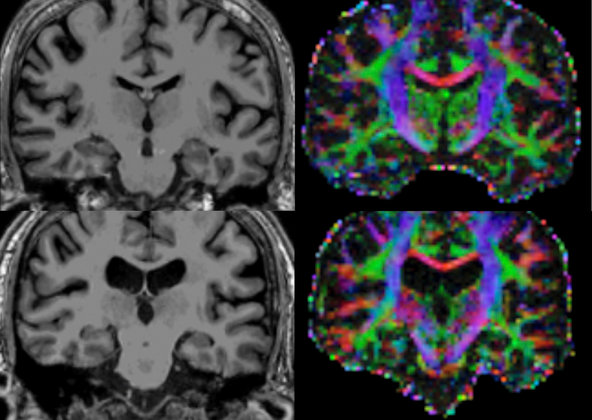Brains of People With Chronic Fatigue Syndrome Offer Clues About Disorder - New York Times: Well (2014)

Brains of People With Chronic Fatigue Syndrome Offer Clues About Disorder - New York Times: Well (2014) is one of many ME/CFS articles by David Tuller.[1]
The images document neuroinflammation which causes many neurological symptoms experienced by patients.
Plainly seen is the result of neuroinflammation's impact on the brain.
Brain imaging studies mentioned in article[edit | edit source]
- 2014, The Stanford ME/CFS Initiative, directed by Dr. Jose Montoya and working with Dr. Michael Zeineh and colleagues, studied the brains of patients with chronic fatigue syndrome (CFS) and healthy people and found distinct differences between the two groups. Radiology researchers have discovered that the brains of patients with CFS have diminished white matter and white matter abnormalities in the right hemisphere.[2][3][1]
- 2014, A Japanese PET scan study looked at neuroinflammation in 9 patients with ME/CFS and 10 controls. They measured a protein expressed by activated microglia, and found that values in the cingulate cortex, hippocampus, amygdala, thalamus, midbrain, and pons were 45%–199% higher in ME/CFS patients than in healthy controls. The values in the amygdala, thalamus, and midbrain positively correlated with cognitive impairment score, the values in the cingulate cortex and thalamus positively correlated with pain score, and the value in the hippocampus positively correlated with depression score.[4][1]
Myalgic encephalomyelitis[edit | edit source]
Myalgic encephalomyelitis (ME) was the original name for chronic fatigue syndrome (CFS); the names are often used interchangeably or with the acronym ME/CFS.[5] The name Myalgic Encephalomyelitis was coined by the Lancet journal following the 1955 Royal Free Hospital outbreak, [6] although it is often wrongly attributed to Melvin Ramsay.[7][8][9] and is a portmanteau of several of the key signs and symptoms of the disease: myalgic (muscle pain), encephalo (brain), myel (spinal cord), itis (inflammation).[10] The central nervous system (brain and spinal cord) are inflamed.[10]
- -Myel: Relating to the spinal cord.[13]
- -Itis: Inflammation.[14][10]
Criteria defining ME, CFS, and ME/CFS[edit | edit source]
Patients that meet the International Consensus Criteria (ICC) defining ME are usually more severely impaired than patients that meet the Canadian Consensus Criteria (CCC) defining ME/CFS, or the minimum core symptoms needed to diagnose patients with Systemic Exertion Intolerance Disease (SEID); also an ME/CFS criterion. Researchers believe all patients meeting these criterion, including Fukuda criteria (with post-exertional malaise "option") defining CFS, are experiencing brain inflammation.[15][16]
See also[edit | edit source]
- Jose Montoya
- Jarred Younger
- Michael Zeineh
- Stanford ME/CFS Initiative
- Neuroimaging
- fMRI
- Neuroinflammation
Learn more[edit | edit source]
References[edit | edit source]
- ↑ 1.0 1.1 1.2 Tuller, David (November 14, 2014). "Brains of People With Chronic Fatigue Syndrome Offer Clues About Disorder". The New York Times - Well. Retrieved November 28, 2018.
- ↑ Zeineh, Michael M.; Kang, James; Atlas, Scott W.; Raman, Mira M.; Reiss, Allan L.; Norris, Jane L.; Valencia, Ian; Montoya, Jose G. (February 2015). "Right Arcuate Fasciculus Abnormality in Chronic Fatigue Syndrome". Radiology. 274 (2): 517–526. doi:10.1148/radiol.14141079. ISSN 0033-8419.
- ↑ Goldman, Bruce (October 28, 2014). "Study finds brain abnormalities in chronic fatigue patients". Standford University News Center. Retrieved January 10, 2020.
- ↑ Nakatomi, Yasuhito; Mizuno, Kei; Ishii, Akira; Wada, Yasuhiro; Tanaka, Masaaki; Tazawa, Shusaku; Onoe, Kayo; Fukuda, Sanae; Kawabe, Joji; Takahashi, Kazuhiro; Kataoka, Yosky; Shiomi, Susumu; Yamaguti, Kouzi; Inaba, Masaaki; Kuratsune, Hirohiko; Watanabe, Yasuyoshi (March 24, 2014), "Neuroinflammation in Patients with Chronic Fatigue Syndrome/Myalgic Encephalomyelitis: An ¹¹C-(R)-PK11195 PET Study", Journal of Nuclear Medicine, 55 (6): 945-50, doi:10.2967/jnumed.113.131045, PMID 24665088
- ↑ Carruthers, Bruce M.; Jain, Anil Kumar; De Meirleir, Kenny L.; Peterson, Daniel L.; Klimas, Nancy G.; Lerner, A. Martin; Bested, Alison C.; Flor-Henry, Pierre; Joshi, Pradip; Powles, AC Peter; Sherkey, Jeffrey A.; van de Sande, Marjorie I. (2003), "Myalgic Encephalomyelitis/Chronic Fatigue Syndrome: Clinical Working Case Definition, Diagnostic and Treatment Protocols" (PDF), Journal of Chronic Fatigue Syndrome, 11 (2): 7–115, doi:10.1300/J092v11n01_02
- ↑ "A new clinical entity?" (PDF). Lancet. 1: 789–790. 1956.
- ↑ Speight, Nigel (2013). "Myalgic encephalomyelitis/chronic fatigue syndrome: Review of history, clinical features, and controversies". Saudi J Med Med Sci. 1 (1): 11–13. doi:10.4103/1658-631x.112905.
- ↑ Smith, David G (1989). Understanding M.E.: The Phenomenon of Myalgic Encephalomyelitis and Acute Onset Post Viral Fatigue Syndrome. p. 20.
- ↑ "An Outbreak of Encephalomyelitis in the Royal Free Hospital Group, London, in 1955". British Medical Journal. 2 (5050): 895–904. October 19, 1957. ISSN 0007-1447. PMID 13472002.
- ↑ 10.0 10.1 10.2 Hooper, Malcolm. "The Terminology of ME & CFS".
- ↑ "myalgic". TheFreeDictionary.com. Retrieved August 12, 2018.
- ↑ "encephalo-". TheFreeDictionary.com. Retrieved August 12, 2018.
- ↑ "myel-". TheFreeDictionary.com. Retrieved August 12, 2018.
- ↑ "Itis". TheFreeDictionary.com. Retrieved August 12, 2018.
- ↑ Morris, Gerwyn; Maes, Michael (December 2013). "Myalgic encephalomyelitis/chronic fatigue syndrome and encephalomyelitis disseminata/multiple sclerosis show remarkable levels of similarity in phenomenology and neuroimmune characteristics". BMC Medicine. 11 (1): 205. doi:10.1186/1741-7015-11-205. ISSN 1741-7015. PMC 3847236. PMID 24229326.
- ↑ Nakatomi, Y.; Mizuno, K.; Ishii, A.; Wada, Y.; Tanaka, M.; Tazawa, S.; Onoe, K.; Fukuda, S.; Kawabe, J.; Takahashi, Kazuhiro; Kataoka, Yosky; Shiomi, Susumu; Yamaguti, Kouzi; Masaaki, Inaba; Kuratsune, Hirohiko; Watanabe, Yasuyoshi (June 1, 2014). "Neuroinflammation in Patients with Chronic Fatigue Syndrome/Myalgic Encephalomyelitis: An 11C-(R)-PK11195 PET Study". Journal of Nuclear Medicine. 55 (6): 945–950. doi:10.2967/jnumed.113.131045. ISSN 0161-5505.

